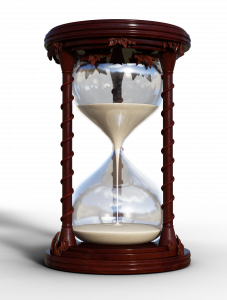It’s Important to Know the Destination Before You Start Your Journey

Intentional goal setting, including writing them down, is directly connected to the successful outcome of goals. For years we have heard of how often New Year’s resolutions fail. Some statistics show that as much as 60 percent of people abandon them within the first six months. This is due to a lack of commitment.
Jesus’ goal was set from the very beginning. He knew the cost and the destination before He started, He never lost sight or veered from it. Even knowing the cost, He was willing to commit to it. He knew the goal was worth the ultimate cost. We see this in Luke 13:31-35 when He is unwilling to stop doing His work even when confronted by the enemy.
We need to determine where we want to go in this life and beyond and realize it is worth the cost.
Jesus uses the analogy of a hen gathering chicks under her wings in this Scripture. Pastor Lee told a story of a chicken house that was burned down. When looking through the ashes the farmer found a dead hen laying on the floor, her feathers burnt off her back. As he rolled her over chicks came running out, still alive. She put the chicks needs ahead of her own.
We are chicks having had the ultimate price paid for us. We need to repay that gift by being the hen and put other’s ahead of ourselves.

Often, we head off in a direction without thinking it through. We think we have it all figured out. Then when we run into a barricade, we continue bouncing off it, still thinking we know best. Many times, after we have either crashed through or given up, we find there was a better way.
A good example of this barricade banging is when a young boy was sick in the hospital. A doctor who specialized in his illness was called in. While driving to the hospital the doctor was confronted at a stoplight by a man with a gun. The doctor tried to explain the dire emergency, but the man didn’t care. He wanted the doctor’s car, so the doctor gave it to him.
After the doctor finally hailed a cab and caught a train, he made it to the hospital, but it was too late, the boy had died. The doctor was shown to the family in the waiting room. There stood the man who had stolen his car. It was the boy’s father. The father refused to listen to the man who could have saved his son. Too often this is the way we treat the One who can save us. We just keep banging into the barricades over and over and over. Jesus doesn’t want this for us.

The price for our eternal journey has been paid. We just need choose the destination.



 constantly wanting more TIME. To use a line from actress
constantly wanting more TIME. To use a line from actress 

 I decided to write about this core value while reading “The Seventh Most Important Thing”, by Shelley Pearsall. In the story Mr. Hampton leaves a hand-written message for Arthur on a piece of cardboard,
I decided to write about this core value while reading “The Seventh Most Important Thing”, by Shelley Pearsall. In the story Mr. Hampton leaves a hand-written message for Arthur on a piece of cardboard,  It has been my experience when building a building that people have a dream of what they envision the finished project to look like. The problem is, they don’t know how to get that dream from their head to a physical structure. This is where vision comes in. The vision is the process of taking the imagined and turning it into reality. This provides a clear and intentional plan for building the dream.
It has been my experience when building a building that people have a dream of what they envision the finished project to look like. The problem is, they don’t know how to get that dream from their head to a physical structure. This is where vision comes in. The vision is the process of taking the imagined and turning it into reality. This provides a clear and intentional plan for building the dream.
 importance of being intentional about the plan.
importance of being intentional about the plan. Think of your life or business as a construction project. It all begins with a dream. You can see the vision of the completed project in your mind. The tricky part is getting that dream out of your head and making it a reality? Having it drawn out will let you see if it looks like your dream or not. It’s better and easier to make changes and corrections during the planning, rather than the construction. It improves the clarity of communication between all parties involved.
Think of your life or business as a construction project. It all begins with a dream. You can see the vision of the completed project in your mind. The tricky part is getting that dream out of your head and making it a reality? Having it drawn out will let you see if it looks like your dream or not. It’s better and easier to make changes and corrections during the planning, rather than the construction. It improves the clarity of communication between all parties involved.
 passed since then, that for most people it’s become a distant memory. If you have ever talked with someone who went through the depression or a similar experience, saving money was more than something that needed to be done, it often was the difference between life and death.
passed since then, that for most people it’s become a distant memory. If you have ever talked with someone who went through the depression or a similar experience, saving money was more than something that needed to be done, it often was the difference between life and death. way to separate money that would be needed later. How was I going to do it? Several years ago, my wife and I found out about Dave Ramsey and his Financial Peace Program**. It is a program that teaches you to, “Live like no one else, so that later you can live like no one else.” The very first lesson he teaches is “Super Saving”. It is a common-sense approach to saving money and the reasons it is important to do so. This was great for my personal finances but wasn’t an exact fit for my business.
way to separate money that would be needed later. How was I going to do it? Several years ago, my wife and I found out about Dave Ramsey and his Financial Peace Program**. It is a program that teaches you to, “Live like no one else, so that later you can live like no one else.” The very first lesson he teaches is “Super Saving”. It is a common-sense approach to saving money and the reasons it is important to do so. This was great for my personal finances but wasn’t an exact fit for my business.
 Most people seem to be looking forward to retirement. Often, it’s viewed as the target that we should be aiming at. Once we’ve reached retirement, everything is smooth sailing from there. We can sleep in, don’t have to get up and go to a JOB; no more rat race for us. I’ve worked hard my whole life and now I get the ‘retirement prize’.
Most people seem to be looking forward to retirement. Often, it’s viewed as the target that we should be aiming at. Once we’ve reached retirement, everything is smooth sailing from there. We can sleep in, don’t have to get up and go to a JOB; no more rat race for us. I’ve worked hard my whole life and now I get the ‘retirement prize’. forced to work for a ruler, required to serve a king or had mandatory employment to some dictator. This gave little or no freedom for personal choices or for the opportunity to live the life of your dreams. Retirement, as it is most commonly thought of today, can be traced to a program designed by Otto von Bismarck, a German Chancellor, in 1881
forced to work for a ruler, required to serve a king or had mandatory employment to some dictator. This gave little or no freedom for personal choices or for the opportunity to live the life of your dreams. Retirement, as it is most commonly thought of today, can be traced to a program designed by Otto von Bismarck, a German Chancellor, in 1881 

